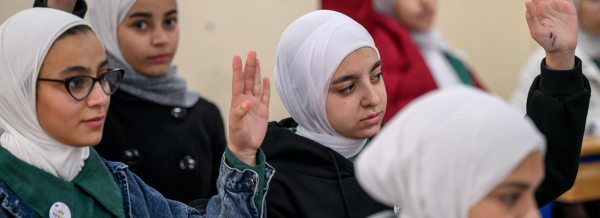
Blog | Child Protection and Education Communities Call for the Protection of Education from Attack

In 2020 the widespread closures of schools around the world drew global attention as children and young people across all corners of the globe were shut out of schools as result of the COVID-19 crisis. As many as 1.6 billion students saw their education disrupted, drawing global attention as the impact of the crisis became more visible. Heads of State, policy makers, the media and the public realised the critical role that quality education plays in children’s development and in ensuring their protection and wellbeing.
Today, on the International Day to Protect Education from Attack, it is time for the same intensity of focus to be given to the impact of the violent attacks on education that continue unabated in conflicts around the world. When education is attacked it has severe, often irreversible impacts on the well-being and learning of children and young people..
The Alliance for Child Protection in Humanitarian Action (CPHA) and the Inter-agency Network for Education in Emergencies (INEE) are calling for increased global attention and action to prevent deliberate attacks on education and to ensure schools are safe and protective environments where all children and young people can learn and thrive without fear.
Access to safe inclusive and equitable quality education provides children and young people with the protective environment they need in order to develop, learn, and reach their full potential. Attacks on education risk put the lives of children and young people at risk and cause physical and psychological harm.
The deliberate targeting of school infrastructure is in direct violation of the Geneva Convention, and a gross violation of children’s rights. Protecting attacks on education is vital to prevent immediate harm to children and young people.
“Some kids are interrogated [by soldiers] so many times that they move to another area. The kids who have heard bombs before or lost parents become traumatized when they see the guns. There are soldiers in front of the schools, so children are afraid to go to school to see those soldiers.” (Student Ukraine, Save the Children Ukraine).
This should not be the experience of any child or young person and we must work together to prevent this at all levels.
Beyond the immediate impact of conflict and direct attacks, there are long-lasting consequences on the learning, health and wellbeing of children, as witnessed in Yemen. The most recent data from UNICEF shows that at least 2 million children are out of school as a result of the ongoing conflict in Yemen, hundreds of thousands are missing out as direct results of attacks on education. Kholood, a 13 year-old girl who missed more than a year’s education after being displaced by the conflict, now finally back in school says “I feel afraid when I walk to school because cars are speeding, and I’m scared of the shelling. I don’t know if I should go home when I hear bombing or if should stay at the school,” she adds “I hope that one day peace will prevail, and I will be able to go to a beautiful and safe school” (UNICEF, 2021)
For millions of children and young people around the world living in the midst of conflict, the simple feeling of being safe in their communities and at school remains a distant hope.
INEE and the Alliance for Child Protection in Humanitarian Action are committed to building closer collaboration between education and child protection actors to help mitigate the long term harm and denial of the right to education in situations of conflict. Collaboration Across Child Protection and Education in Emergencies is vital to keep children learning in a safe and protective environment.
We are committed to developing and supporting education and child protection practitioners in humanitarian settings with the tools and guidance and learning opportunities for them to work together to support children in insecure environments.
Today, as we mark the second International Day to Protect Education from Attack, it is important for the world to pay attention to the devastating impact of the deliberate targeting of education and we must #UniteToProtect education from attack. Education is a fundamental human right of every child, and ensuring the right to quality education is key to protecting children and young people and ensuring their healthy development. Increased collaboration between education actors and child protection actors is essential to ensure children are protected in safe schools and enjoy their right to inclusive and quality education.
A failure to act today and in the coming weeks, months and years undermines the pledge made by world leaders in the 2030 agenda for sustainable development to create a world where “every child grows up free from violence and exploitation” (UN 2015).
For more information on our work and access to our tools and resources, please visit: www.alliancecpha.org/en/education_in_emergencies
About the Authors:
Elspeth Chapman is the Strategic Partnerships and Advocacy Specialist for the Alliance for the Child Protection in Humanitarian Action. She has over 10 years of humanitarian experience in both technical child protection and senior leadership roles with INGOs and UN agencies. Elspeth has also worked with conflict-affected populations in multiple contexts including Afghanistan, the Syria Crisis response in Jordan and Lebanon, Palestine, Libya and South Sudan.
Kate Moriarty has been working in the field of education for more than 20 years. In her early career Kate worked as a human rights and adult educator, later focusing on policy and advocacy, working for a number of NGOs and the UN. Kate is a qualified teacher and holds a BSc in Sociology from the London School of Economics, and an MA in politics and development from the Institute of Latin American Studies. She has recently completed a Doctorate in International Education at the University of Sussex; her research provides a critical examination of the Sustainable Development Goal for Education (SDG 4).
- 131 views
